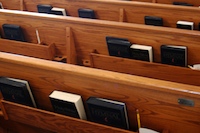The real point of the poem, however, is the vanity of the young lady. She, noticing the looks and pointing directed her way, vainly thinks they are admiring her and begins to toss her hair. The last stanza, in modern English (Burns wrote in Scottish), says:
O would some Power the gift to give us
To see ourselves as others see us!
It would from many a blunder free us,
And foolish notion:
What airs in dress and gait would leave us,
And even devotion!
It's a brilliant thought, and I could certainly do worse than write on this idea. Yet my thoughts are turned a different direction. I can't help but think how many people are like this poet. They go to a church service and spend their time focused on the people around them. How many times do you hear people say, "I'm not interested in being part of a church ... they're all a bunch of hypocrites"?
I think we need to raise our vision. We need to accept that churches are made up of humans, with all their flaws. When we become part of a group of believers, we are seeking more than human interaction; we are admitting to a belief in something above and beyond those people. Attending a church service should be more than seeing and being seen; our focus should be on the One who is unseen.
If you think that church is full of vain and shallow people, like the young lady in this poem, let me invite you to look again. Look beyond the people. Church isn't mainly about us; it's about the God that calls us together.










Reader Comments
Archived Facebook Comments